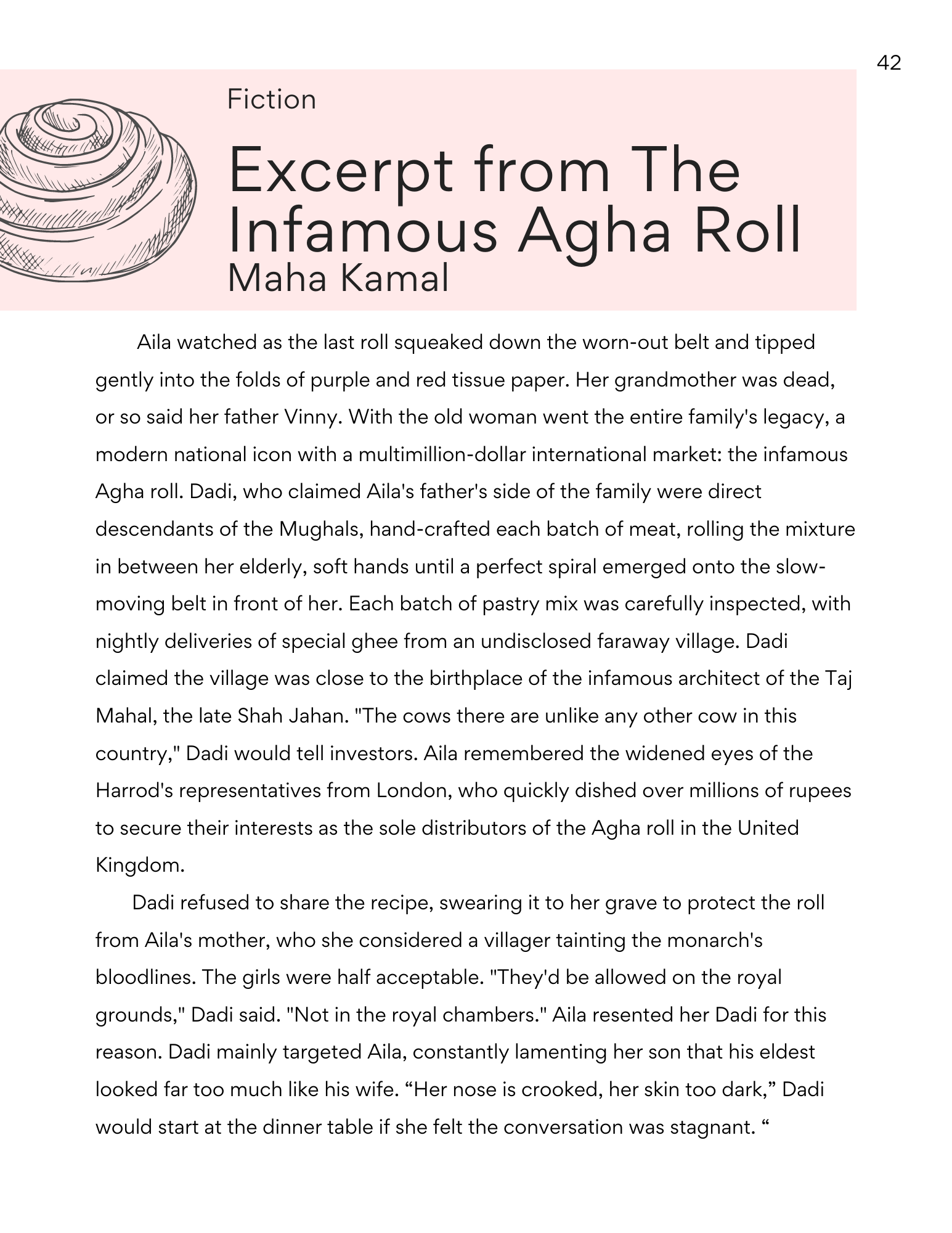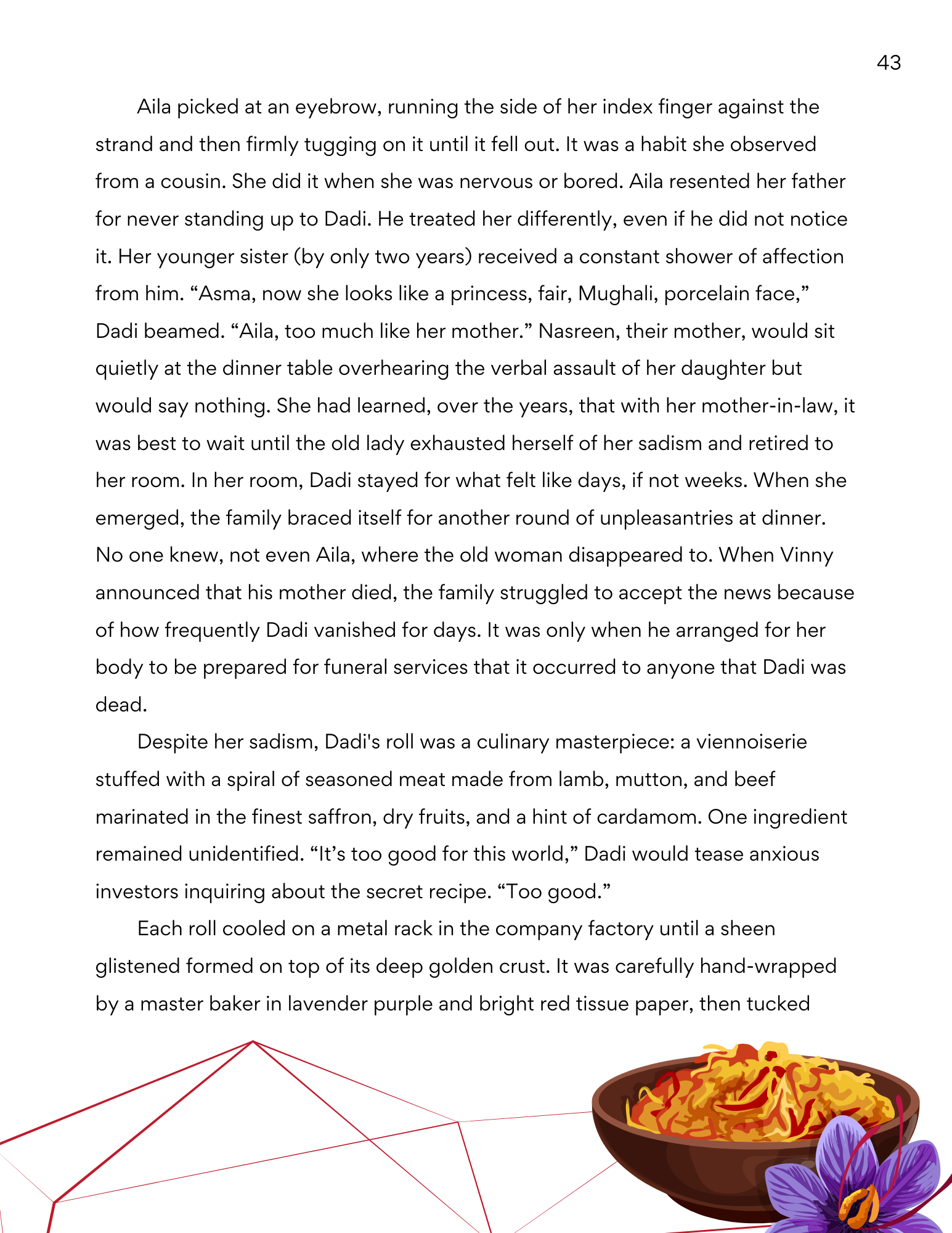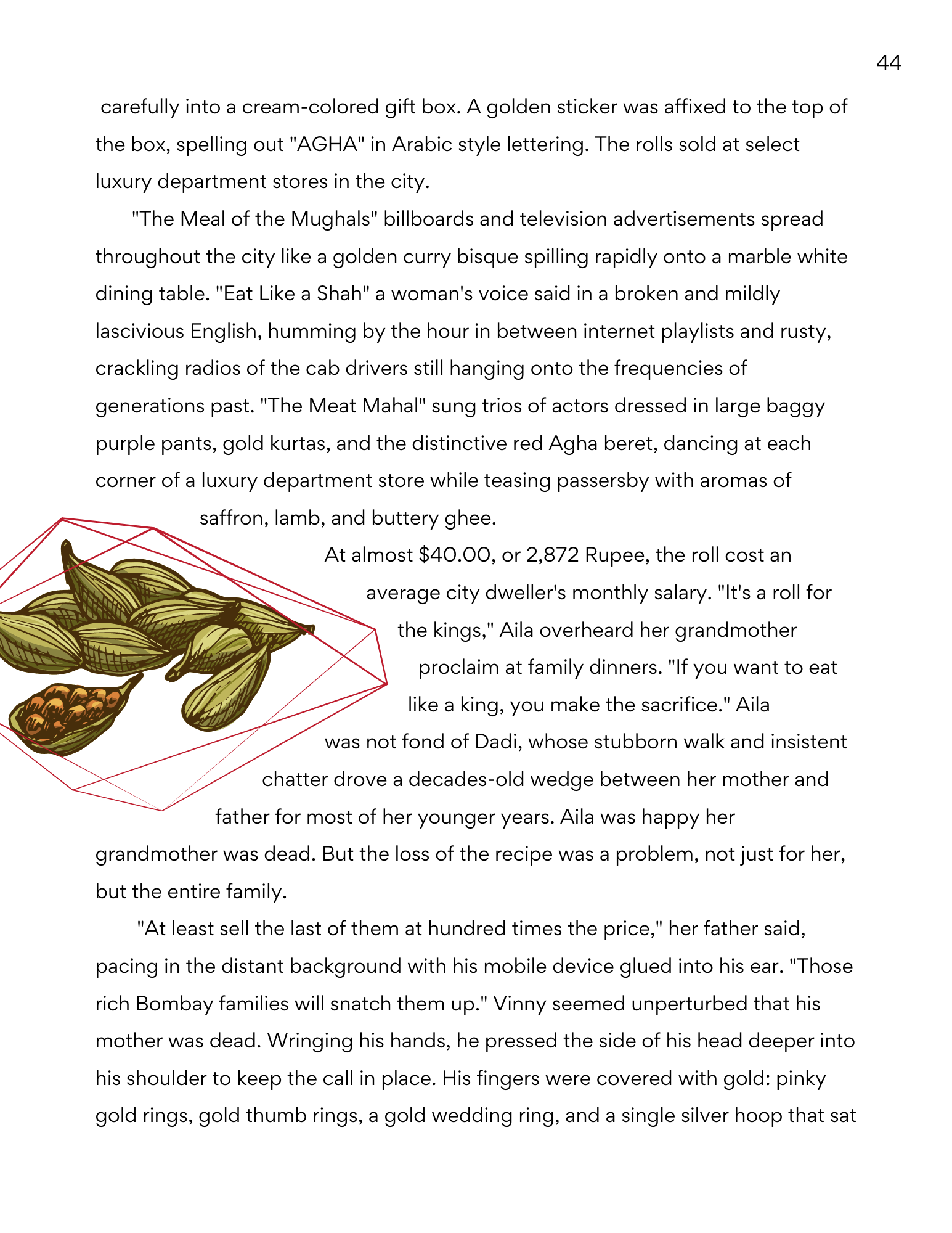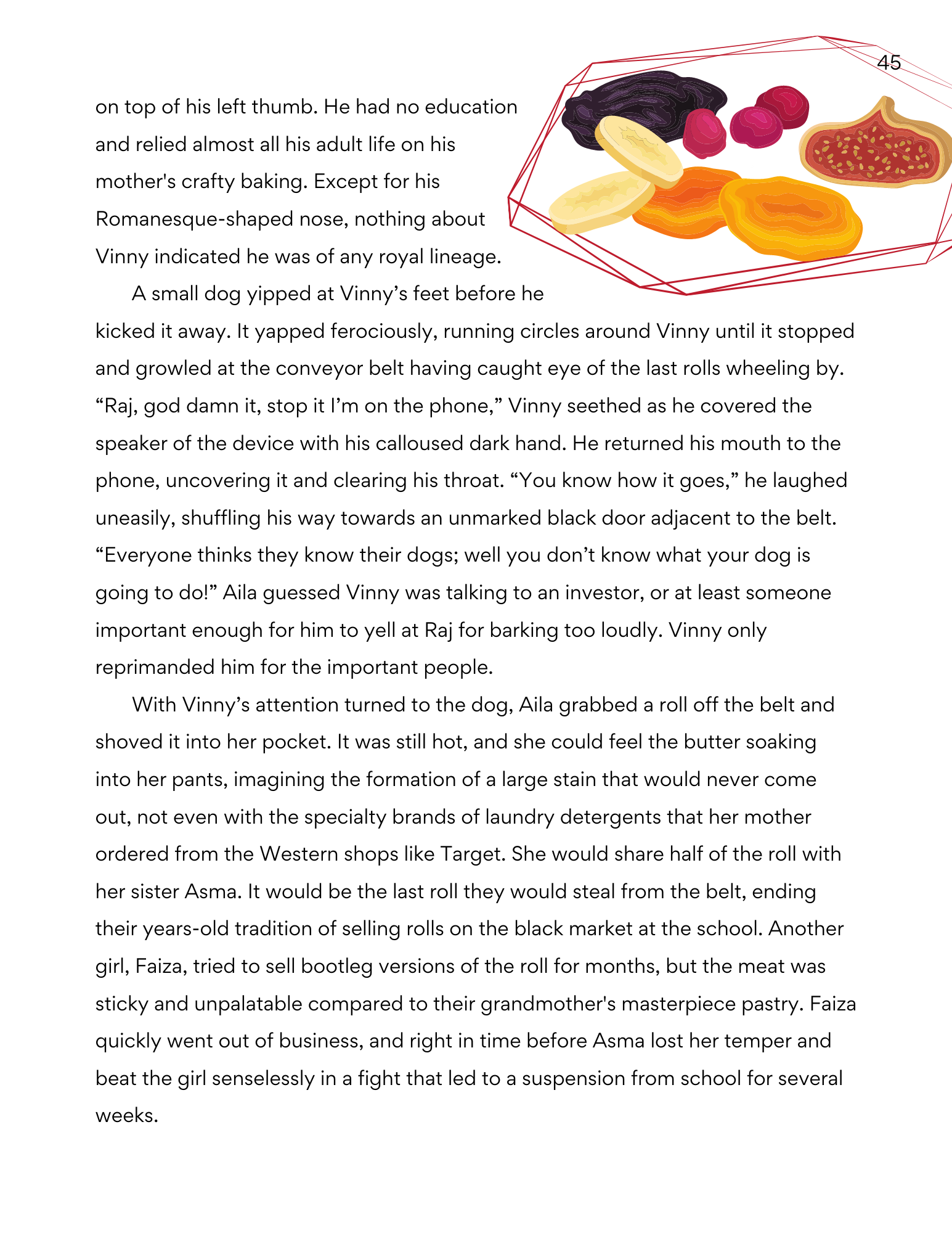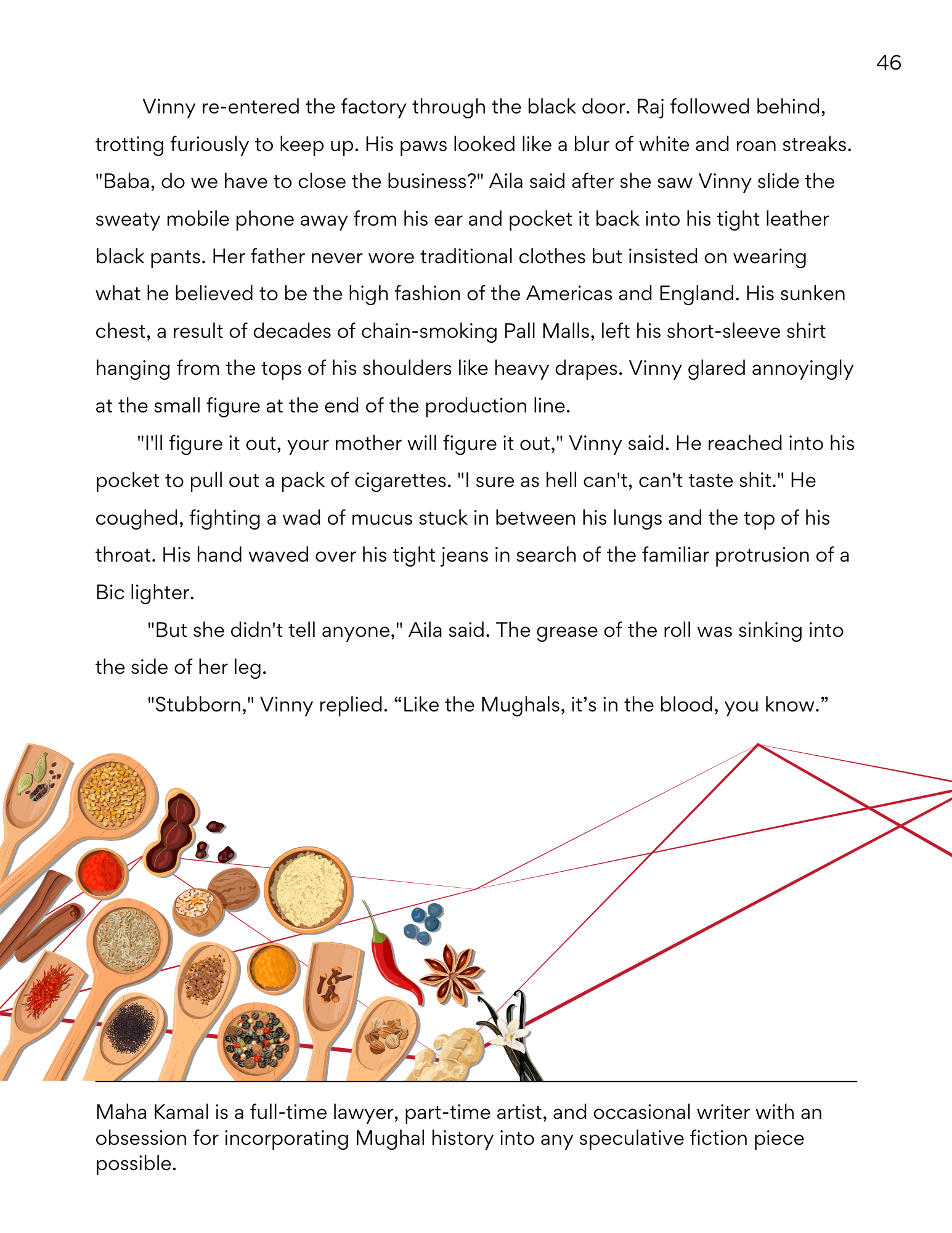Excerpt from The Infamous Agha Roll
Aila watched as the last roll squeaked down the worn-out belt and tipped gently into the folds of purple and red tissue paper. Her grandmother was dead, or so said her father Vinny. With the old woman went the entire family's legacy, a modern national icon with a multimillion-dollar international market: the infamous Agha roll. Dadi, who claimed Aila's father's side of the family were direct descendants of the Mughals, hand-crafted each batch of meat, rolling the mixture in between her elderly, soft hands until a perfect spiral emerged onto the slow-moving belt in front of her. Each batch of pastry mix was carefully inspected, with nightly deliveries of special ghee from an undisclosed faraway village. Dadi claimed the village was close to the birthplace of the infamous architect of the Taj Mahal, the late Shah Jahan. "The cows there are unlike any other cow in this country," Dadi would tell investors. Aila remembered the widened eyes of the Harrod's representatives from London, who quickly dished over millions of rupees to secure their interests as the sole distributors of the Agha roll in the United Kingdom.
Dadi refused to share the recipe, swearing it to her grave to protect the roll from Aila's mother, who she considered a villager tainting the monarch's bloodlines. The girls were half acceptable. "They'd be allowed on the royal grounds," Dadi said. "Not in the royal chambers." Aila resented her Dadi for this reason. Dadi mainly targeted Aila, constantly lamenting her son that his eldest looked far too much like his wife. “Her nose is crooked, her skin too dark,” Dadi would start at the dinner table if she felt the conversation was stagnant. “
Aila picked at an eyebrow, running the side of her index finger against the strand and then firmly tugging on it until it fell out. It was a habit she observed from a cousin. She did it when she was nervous or bored. Aila resented her father for never standing up to Dadi. He treated her differently, even if he did not notice it. Her younger sister (by only two years) received a constant shower of affection from him. “Asma, now she looks like a princess, fair, Mughali, porcelain face,” Dadi beamed. “Aila, too much like her mother.” Nasreen, their mother, would sit quietly at the dinner table overhearing the verbal assault of her daughter but would say nothing. She had learned, over the years, that with her mother-in-law, it was best to wait until the old lady exhausted herself of her sadism and retired to her room. In her room, Dadi stayed for what felt like days, if not weeks. When she emerged, the family braced itself for another round of unpleasantries at dinner. No one knew, not even Aila, where the old woman disappeared to. When Vinny announced that his mother died, the family struggled to accept the news because of how frequently Dadi vanished for days. It was only when he arranged for her body to be prepared for funeral services that it occurred to anyone that Dadi was dead.
Despite her sadism, Dadi's roll was a culinary masterpiece: a viennoiserie stuffed with a spiral of seasoned meat made from lamb, mutton, and beef marinated in the finest saffron, dry fruits, and a hint of cardamom. One ingredient remained unidentified. “It’s too good for this world,” Dadi would tease anxious investors inquiring about the secret recipe. “Too good.”
Each roll cooled on a metal rack in the company factory until a sheen glistened formed on top of its deep golden crust. It was carefully hand-wrapped by a master baker in lavender purple and bright red tissue paper, then tucked carefully into a cream-colored gift box. A golden sticker was affixed to the top of the box, spelling out "AGHA" in Arabic style lettering. The rolls sold at select luxury department stores in the city.
"The Meal of the Mughals" billboards and television advertisements spread throughout the city like a golden curry bisque spilling rapidly onto a marble white dining table. "Eat Like a Shah" a woman's voice said in a broken and mildly lascivious English, humming by the hour in between internet playlists and rusty, crackling radios of the cab drivers still hanging onto the frequencies of generations past. "The Meat Mahal" sung trios of actors dressed in large baggy purple pants, gold kurtas, and the distinctive red Agha beret, dancing at each corner of a luxury department store while teasing passersby with aromas of saffron, lamb, and buttery ghee.
At almost $40.00, or 2,872 Rupee, the roll cost an average city dweller's monthly salary. "It's a roll for the kings," Aila overheard her grandmother proclaim at family dinners. "If you want to eat like a king, you make the sacrifice." Aila was not fond of Dadi, whose stubborn walk and insistent chatter drove a decades-old wedge between her mother and father for most of her younger years. Aila was happy her grandmother was dead. But the loss of the recipe was a problem, not just for her, but the entire family.
"At least sell the last of them at hundred times the price," her father said, pacing in the distant background with his mobile device glued into his ear. "Those rich Bombay families will snatch them up." Vinny seemed unperturbed that his mother was dead. Wringing his hands, he pressed the side of his head deeper into his shoulder to keep the call in place. His fingers were covered with gold: pinky gold rings, gold thumb rings, a gold wedding ring, and a single silver hoop that sat on top of his left thumb. He had no education and relied almost all his adult life on his mother's crafty baking. Except for his Romanesque-shaped nose, nothing about Vinny indicated he was of any royal lineage.
A small dog yipped at Vinny’s feet before he kicked it away. It yapped ferociously, running circles around Vinny until it stopped and growled at the conveyor belt having caught eye of the last rolls wheeling by. “Raj, god damn it, stop it I’m on the phone,” Vinny seethed as he covered the speaker of the device with his calloused dark hand. He returned his mouth to the phone, uncovering it and clearing his throat. “You know how it goes,” he laughed uneasily, shuffling his way towards an unmarked black door adjacent to the belt. “Everyone thinks they know their dogs; well you don’t know what your dog is going to do!” Aila guessed Vinny was talking to an investor, or at least someone important enough for him to yell at Raj for barking too loudly. Vinny only reprimanded him for the important people.
With Vinny’s attention turned to the dog, Aila grabbed a roll off the belt and shoved it into her pocket. It was still hot, and she could feel the butter soaking into her pants, imagining the formation of a large stain that would never come out, not even with the specialty brands of laundry detergents that her mother ordered from the Western shops like Target. She would share half of the roll with her sister Asma. It would be the last roll they would steal from the belt, ending their years-old tradition of selling rolls on the black market at the school. Another girl, Faiza, tried to sell bootleg versions of the roll for months, but the meat was sticky and unpalatable compared to their grandmother's masterpiece pastry. Faiza quickly went out of business, and right in time before Asma lost her temper and beat the girl senselessly in a fight that led to a suspension from school for several weeks.
Vinny re-entered the factory through the black door. Raj followed behind, trotting furiously to keep up. His paws looked like a blur of white and roan streaks. "Baba, do we have to close the business?" Aila said after she saw Vinny slide the sweaty mobile phone away from his ear and pocket it back into his tight leather black pants. Her father never wore traditional clothes but insisted on wearing what he believed to be the high fashion of the Americas and England. His sunken chest, a result of decades of chain-smoking Pall Malls, left his short-sleeve shirt hanging from the tops of his shoulders like heavy drapes. Vinny glared annoyingly at the small figure at the end of the production line.
"I'll figure it out, your mother will figure it out," Vinny said. He reached into his pocket to pull out a pack of cigarettes. "I sure as hell can't, can't taste shit." He coughed, fighting a wad of mucus stuck in between his lungs and the top of his throat. His hand waved over his tight jeans in search of the familiar protrusion of a Bic lighter.
"But she didn't tell anyone," Aila said. The grease of the roll was sinking into the side of her leg.
"Stubborn," Vinny replied. “Like the Mughals, it’s in the blood, you know.”
